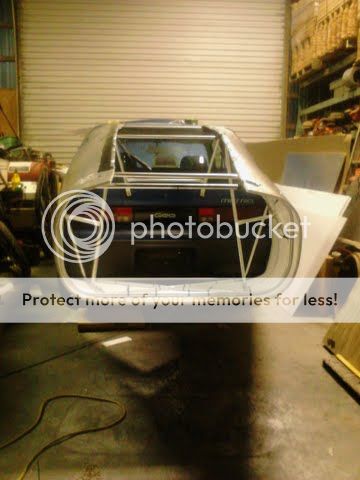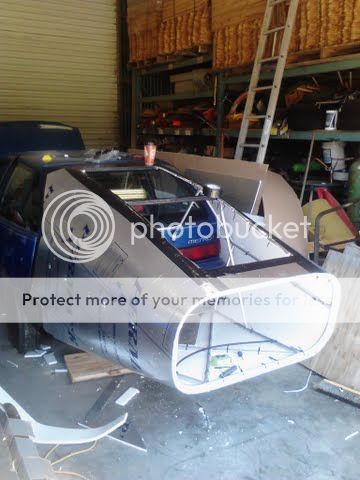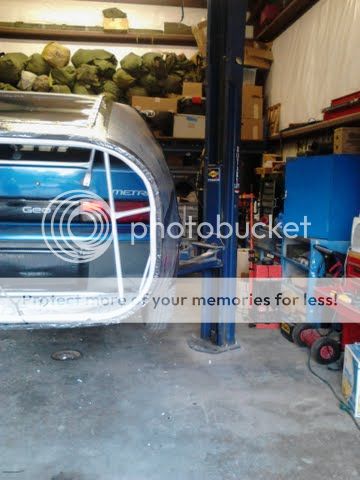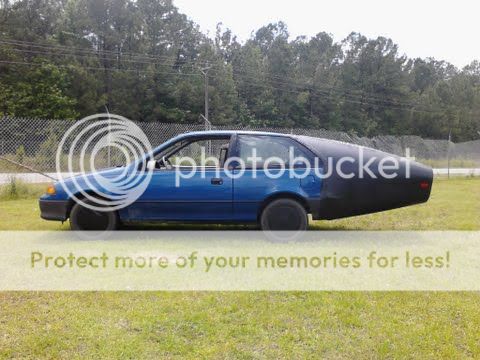Well, I couldn't stand it anymore. After seeing the results of the other boat tailed vehicles here on the site, I decided it was time to jump in the pool and join the party...

It may not be as pretty as Metro's or Three Wheeler's or any of the others here that have ventured in this direction. It does however, do the job...
The building technique and materials used are similar to others here. Yet, slightly different.
So, I thought I'd show how to do it, Redneck style...

The first thing that needs to be done is to establish the center line of the vehicle. In this case, I used the front and rear factory license plate bolt holes then measured and marked the center. (Caution, this may or not be the actual center line) Next I found a flat surface to work on. Using a plumb bob, I transferred the center line of the vehicle to the surface. Then snapped a chalk line between the marks and past the rear of the vehicle several feet. With the chalk line extended it is then possible to locate the center of the rear of the boat tail with the plumb bob. (
important)
I decided to use 1/2" EMT for the frame work as it is relatively inexpensive at about $2 a 10' stick, weighs 2.2 lbs. and is easy to bend and weld.
It's strength also adds significantly to the structural integrity of the tail.
In mocking it up, a step ladder, saw horses, boxes and duct tape were used to help hold the lengths of conduit. (sorry no pictures)

I read somewhere on here that 50% of the template would give me 90% of the result I was looking for.
(Template found here
http://ecomodder.com/forum/showthrea...ion-21952.html)
So, after a little trial and error, this is what I came up with. It added about 4' to the total length of the car.

Where the conduit is attached to the car, it is hammered flat on on side. Where the conduit is welded, it is first slightly flattened on both sides. A conduit bender was used for the 90 degree bends.

The curvature of the top of the boat tail was achieved by jamming a piece of conduit between the upper and lower conduit with the bottom and back being supported. Allowing the top conduit to flex. Then, I just kept taking pictures and adjusting until it fit the template. Once I was satisfied, it was tack welded in place. Then it was removed from the car and fully welded. (additional cross bracing was added to stiffen the cage, not shown in these pics)
Self drilling screws were used to connect the frame to the car initially, then 1/4" bolts after.
Electrical.
I will be using truck-trailer flush mount tail lights.
I disconnected the plugs to the OEM tail lights and used those piggy back snap connectors to attach the new longer wires. Then coiled them up for later.
(since the original plugs are still connected, it can be reversed easily if needed)
Rear panel.
I decided to use plastic corrugated cardboard from Home Depot. It is tough stuff, yet lightweight and $11 per sheet. The rear panel was traced out and cut with snips. It will be installed later
Covering the frame.
I had a little kammback made from 1/2" foam insulation board that I had installed on the car previously. It held up very well. (8 months) So I thought I'd use foam again.
It's ability to conform to complex curves and smooth out transitions is excellent. It is also very light, weighs less than 1lb. and is $10 per sheet. It has aluminum foil attached to one side which would allow it to resist the resins used in fiberglass or a carbon fiber if a more permanent cover is added later.
Starting on the side near the top, a extra set of hands and duct tape were used to help hold the sheet in place as it was trimmed to fit the shape of the back of the car and bent around the frame. Once the shape was done, it was then removed and transferred to the foam sheet for the other side and cut. Making a mirror image.

Attaching it to the frame was a little tricky. Through trial and error, zip ties were eventually decided upon and used with duct tape on the outside underneath the ties to help keep them from pulling through.
The foam when bent, becomes very ridged.

Extra material was left around the window opening and taped down.


Window.
I wanted to be able to see out the back. So I bought a 3x5' sheet of .080 thick acrylic glass for $45. The opening was measured and the material cut. It was then pre drilled before using self piercing screws to hold it down. The extra foam material will be removed later with a razor blade as it was easier to screw down with it in place and made the transition look better.



Bottom.
The car was put on a lift and fitted for the missing triangle of foam and aluminum flashing around the exhaust. Before securing the panel in place the "extra foam" around the edges of the window were trimmed. The panel was then secured with screws, zip ties and tape.

Here are some pics that show how nicely the foam follows the curves of the car and cage.


Here's a side shot at this stage of compleation.

Electrical again.
Lay out and cut holes for lights. Then wire and install panel with self piercing screws. Cost of lights and reflectors were approx. $45.



The third brake light is still in the original rear window location and is functional . It produces a dramatic effect without very much glare in the rear view mirror.
When I get a chance, I'll post a pic.
*update*

Next, tape seams and paint.
Done...


All in all, it cost a little less than $150 and weighed a little less than 30 lbs. I removed the rear seat 27 lbs. since I never use it.
Net gain = 3 lbs.
This was a rushed build. I only had 3 days to complete it (ended up taking 4) before I was scheduled to leave on a trip. (taking this car)
So, what's it like driving it...???
All I can say is
wow...!!!
It was apparent immediately that this mod was worth the trouble.
I went for a quick 2 mile shake down run. (remember, I was already a day late leaving. I didn't have time for "proper" testing)

The MPGuino was reading higher than when the car is fully warm in the middle of summer. When I turned on to the road near my home, I accelerated to my target speed of 35mph. Then at a certain point of the road, I EOC to my drive way. Normally, I reach my drive way with just enough speed to make it comfortably to it's parking spot. Not this time... When I reached the 90 degree turn before my drive, it was still going 25mph.
I had to brake firmly or end up in the ditch...!!!
This mod is starting to looking like a winner.
So, I pack my things, kiss the dog, kick the wife and off I go, Charleston S.C. to Niagara Falls N.Y. for a fishing trip.
Last year the same trip was made in the beginning of September, stats were as follows.
876.12 miles ÷ 14.17 gal. gas = 61.83 mpg.
This year stats.
866.45 miles ÷ 12.22 gal. gas =
70.9 mpg
Return trip last year stats. (made a detour to Cabala's in W.V.)
937.4 miles ÷ 14.7 gal. gas = 63.76 mpg
Return trip this year stats.
866.45 miles ÷ 11.81 gal. gas =
73.36 mpg
(866.45 mi. up and back, chances of that happening again 0%)
Last year average trip mpg = 62.79 mpg
This year boat tail installed =
72.13 mpg
A real world increase of 14.87 %. 
To say that I am pleased with the results would be a understatement.
Now all I have to do is add the rear wheel skirts and a under tray.
I'm sure I missed a few things. So, if anybody has any questions, feel free to ask.
Well... That's my Redneck boat tail.
As Jeff Foxworthy might say...
You might be a Redneck, if... "you buy things to fix your car at Home Depot"
I guess that would mean me...

Here are a few pics from out in the wild...


I would also like to thank my friend Bob for lending a hand.
>